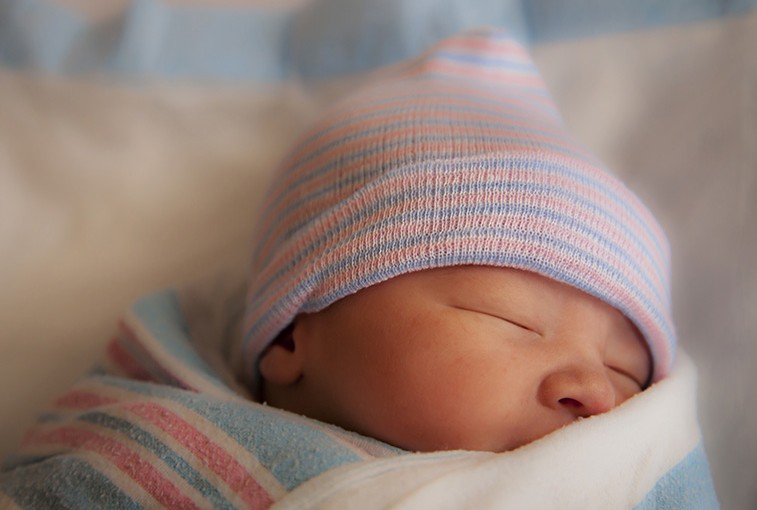The first few minutes after birth are a magical time for bonding with baby.
“I think for a lot of moms, it’s finally that moment where they can just breathe, and at least for me, when I held our first, it was like, you know, this was nine months of not knowing what this child looked like, what they felt like, and finally I can feel that,” said Dr. Michelle Schimelpfenig, a pediatrician at Sanford Health in Sioux Falls, South Dakota.
Research has shown that what happens during the first 60 minutes of a baby’s life, which is often referred to as the golden hour, can maximize the bonding between mother and child.
“The golden hour is very beneficial and critical for even years down the road between both mom and baby. It’s super helpful to stabilize the newborn coming out of utero, as well as bonding,” said Tenelle Choal, a certified nurse-midwife at Sanford Health in Sioux Falls.
Bonding with baby a priority
In the past, bonding with baby often took a back seat to medical procedures. New moms watched their babies being handed to a nurse for examination, cleaning and other details. After all the waiting, the new parents would finally get to hold their baby.
Health care providers now know there’s a better way to spend the first 60 minutes of life.
“Every situation is a little bit different, but in the perfect situation where everything has gone well, baby would be delivered and then immediately baby would go onto mom’s chest and they would do skin-to-skin,” said Dr. Schimelpfenig.
Many hospitals and birthing centers now encourage parents to wait at least an hour before introducing baby to family and friends. Instead, they encourage mother and baby to stay together and, if desired, focus on giving the newborn a chance to breastfeed.
Skin-to-skin contact and the baby’s suckling at the breast brings benefits to mom and baby.
“For baby, it helps for thermal regulation, or a fancy term for helping baby regulate temperature, as well as stabilizing blood sugar,” said Choal. “And then for mom, it helps mom produce hormones that help her to breastfeed and produce milk, as well as decrease stress and anxiety and depression for her.”
As a certified nurse midwife, Choal said she also sees less crying and fussiness with infants that have experienced the golden hour. Research shows these infants also have a history of better sleep quality, growth and breastfeeding rates.
Finding ways to bond
Conventional procedures such as weighing, measuring, bathing, injections or blood tests should wait until after the first feeding, according to Dr. Schimelpfenig.
Even in cases where medical emergencies may change a family’s birth plan, it is possible to take advantage of bonding time in the first few minutes. If a baby needs medical attention or extra stimulation to start breathing, the child can be moved from the exam table to the mother’s chest as soon as the baby is stabilized.
Women who have a planned or unplanned cesarean section may need to wait a few moments to be able to hold the baby. In most cases, after a quick assessment, nurses can move the baby to the mother’s chest. The baby can stay at her mother’s side until she is settled into the recovery room and ready to nurse.
Golden hour benefits for mom and baby
During labor and the minutes and hours afterward, the mother’s body experiences several amazing changes. Giving birth generates changes in a woman’s brain chemistry that increases desire to nurture.
Dr. Schimelpfenig said establishing breastfeeding early on will support good milk supply within the first week. This helps infants regain birth weight and lessens the chance of other health issues.
“If we can work to get nursing established, to have successful breastfeeding, to have ample milk supply, then mom’s milk will come in eventually. And that will really help mitigate or decrease bilirubin (a substance in the blood that can cause newborn jaundice), because the more the baby eats, the more they poop, the more they pee, the more that it flushes out the bilirubin,” she said.
Most hospitals and birthing centers encourage breastfeeding because it protects against certain diseases later into life as well.
“Breastfeeding is great. Current research shows 13 weeks of breastfeeding protects against gastroenteritis for approximately seven years. Four months of breastfeeding protects against ear infections for three years. Fifteen weeks of breastfeeding protects against respiratory infections for seven years, and six months of breastfeeding can protect against Hodgkin’s disease,” said Choal.
Any amount of breastfeeding is shown to protect against wheezing and bronchitis for six to seven years, and it protects against Hib meningitis for up to 10 years.
Expectant mothers should talk with family members and medical staff about their plans for the minutes after birth.
“I think that there is enough research and studies to prove that (the golden hour) is something worth fighting for. And I think from a hospital culture standpoint, you will find most hospitals are going towards as much skin-to-skin and as minimal amount of interventions as we can within the first hour,” said Dr. Schimelpfenig.
Learn more
- The importance of skin-to-skin with baby after delivery
- Learn secrets for an easier labor and delivery
- What to consider when planning where to have your baby
…
Posted In Children's, Pregnancy, Sioux Falls, Women's
